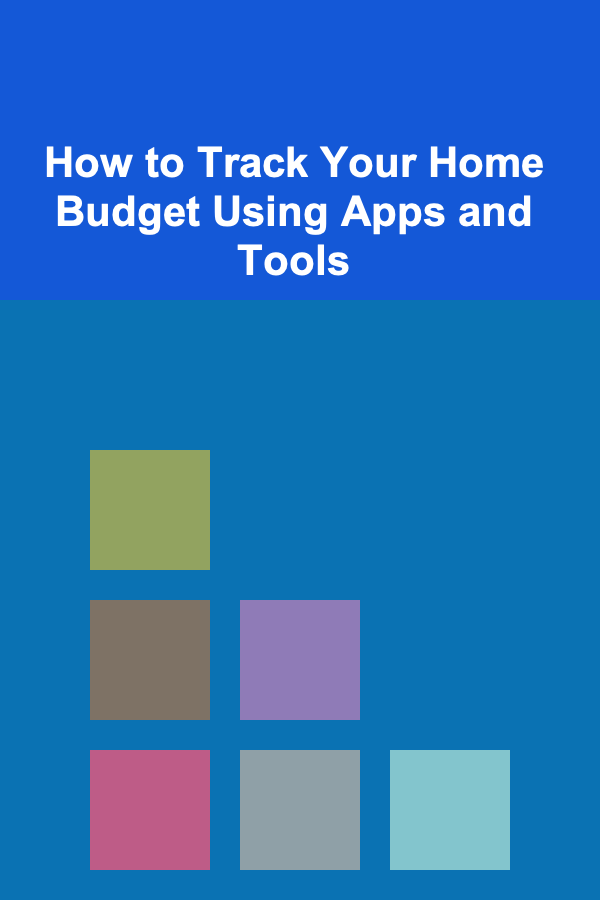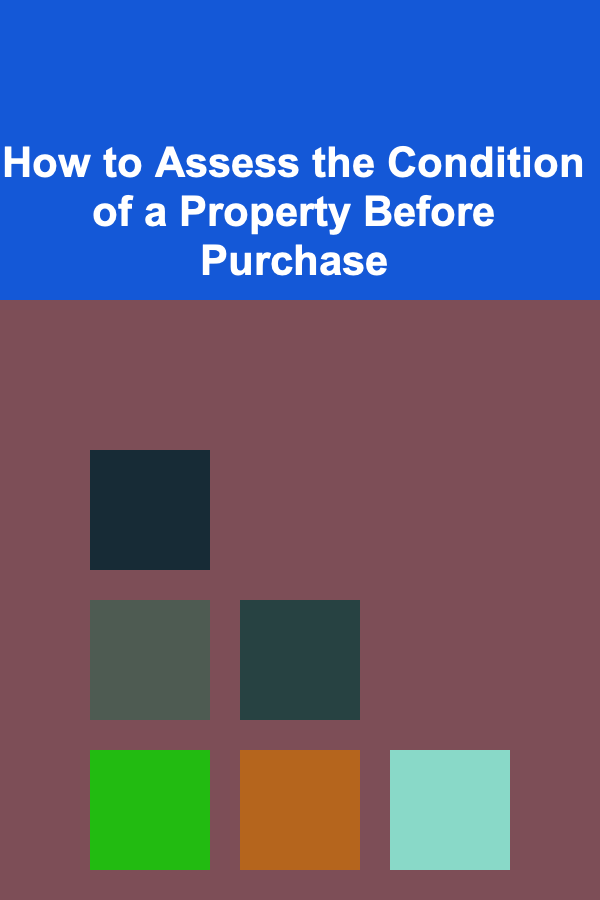
How to Track Your Home Budget Using Apps and Tools
ebook include PDF & Audio bundle (Micro Guide)
$12.99$8.99
Limited Time Offer! Order within the next:

Budgeting is an essential skill for managing personal finances, and in today's digital age, there are a myriad of apps and tools available to help you stay on top of your financial goals. Gone are the days of manually tracking expenses in notebooks or spreadsheets. Now, technology makes it easier than ever to track, analyze, and control your spending with just a few taps on your smartphone.
In this article, we will dive deep into the best methods and tools you can use to track your home budget. We'll explore the importance of budgeting, the role of apps in simplifying the process, and how to maximize the features of different financial tools to ensure your budget aligns with your long-term financial goals.
The Importance of Budgeting
Budgeting is the cornerstone of financial well-being. Without a clear budget, it's easy to lose track of where your money is going, leading to unnecessary debt, missed savings goals, or financial stress. A budget helps you:
- Understand your cash flow: Knowing how much money you bring in versus how much you spend is crucial for making informed financial decisions.
- Identify areas for improvement: Tracking expenses allows you to see where you can cut back or make adjustments in your spending.
- Achieve financial goals: Whether it's saving for a vacation, buying a home, or building an emergency fund, budgeting helps you set clear, actionable steps toward your objectives.
- Reduce financial stress: Having a budget means you're in control, not just hoping for the best at the end of each month.
The process of budgeting has become far more accessible with the help of modern apps and digital tools, making it possible for anyone to start managing their finances effectively, regardless of their level of financial expertise.
Types of Budgeting Apps and Tools
Before delving into the specifics of how to use these tools, it's important to understand the different types of budgeting tools available and how they can help you manage your home budget.
1. Expense Tracking Apps
Expense tracking apps are designed to monitor your spending and categorize each purchase automatically. These apps often connect to your bank accounts or credit cards to pull in transactions and categorize them in real time. Popular examples include:
- Mint: Mint is a comprehensive personal finance app that automatically tracks your spending, categorizes transactions, and provides budgeting insights. It's user-friendly and free, making it a great choice for beginners.
- PocketGuard: This app links to your accounts and categorizes your transactions, allowing you to see how much money you have left for discretionary spending. It's particularly helpful if you're looking for a straightforward way to avoid overspending.
- You Need a Budget (YNAB): YNAB offers a proactive budgeting approach, encouraging users to assign every dollar a job. It's known for its educational content, helping users learn to save and budget effectively.
2. Full Financial Management Apps
If you're looking for a more holistic approach to budgeting, full financial management apps go beyond simple expense tracking. These apps often provide insight into your investments, loans, and savings, in addition to your everyday expenses. Popular options include:
- Personal Capital: Personal Capital not only tracks your spending but also provides tools for managing investments and retirement accounts. It's ideal for individuals who want a more comprehensive view of their financial situation.
- EveryDollar: Created by financial guru Dave Ramsey, EveryDollar is designed around a zero-based budgeting method. It allows you to plan your expenses in advance, ensuring that you allocate every dollar toward a specific category.
3. Simple Budgeting Apps
For people who prefer a more manual approach or those who like to maintain a closer connection with their finances, simple budgeting apps allow you to track your income and expenses with a bit more flexibility. These apps might not automatically categorize your expenses, but they give you full control over the process.
- GoodBudget: This envelope-based budgeting app helps users allocate money for different categories of spending, such as groceries, entertainment, and savings. It's a great way to stick to your budget while seeing exactly how much you have left to spend in each category.
- Wally: Wally is a simple but powerful budgeting app that allows you to track your income and expenses manually or automatically. It offers users insights into their financial habits and provides a detailed overview of their spending.
4. Cash Flow and Bill Management Tools
For those who are focused more on bill payments and cash flow management, there are apps that specialize in helping you stay on top of due dates, balances, and recurring expenses.
- Prism: Prism tracks your bills and automatically updates you with the latest balances and due dates. It's especially helpful if you have multiple subscriptions and bills to manage, ensuring you never miss a payment.
- Bill Tracker: This app is designed to track your regular bills and expenses, helping you set reminders and ensuring you're not caught off guard by upcoming payments.
How to Choose the Right Budgeting App
With so many options available, choosing the right app for your home budget can feel overwhelming. Here are some factors to consider when making your decision:
1. Ease of Use
One of the most important features of a budgeting app is its usability. The app should be intuitive and easy to navigate, allowing you to input transactions or check your budget with minimal effort. If an app feels too complicated or overwhelming, you may lose motivation to use it regularly.
2. Automated vs. Manual Tracking
Some people prefer automation because it saves time and minimizes the need for manual data entry. Automated tools, like Mint or PocketGuard, pull transaction data directly from your bank accounts. On the other hand, manual tracking apps like GoodBudget or Wally give you more control over the process, but they require more effort.
3. Customization Options
Every household has unique budgeting needs, so the app you choose should allow you to tailor your categories, goals, and budgeting rules. Apps like YNAB and EveryDollar are excellent in this regard, offering flexibility for users to customize their budgets.
4. Security and Privacy
Because budgeting apps connect to your financial accounts, it's critical to ensure that the app prioritizes security. Look for apps that use encryption, two-factor authentication, and other safety measures to protect your sensitive information.
5. Cost
Many budgeting apps are free, but some require a subscription or one-time purchase. Consider your budget and whether the additional features of paid apps justify the cost. Popular apps like Mint and GoodBudget offer free versions, while apps like YNAB and Personal Capital have premium options.
Maximizing the Features of Budgeting Tools
Once you've chosen an app or tool to help manage your budget, it's important to make the most of its features. Here are some tips for getting the most out of your budgeting app:
1. Set Clear Financial Goals
Before you start entering transactions into your app, think about your financial goals. Whether you're saving for a down payment on a house, paying off credit card debt, or building an emergency fund, your budgeting tool should reflect these priorities. Many apps allow you to set goals, making it easier to track your progress and stay motivated.
2. Categorize Expenses Carefully
Effective categorization is crucial for getting a clear picture of your spending habits. Most apps will automatically categorize transactions, but it's important to review these categories regularly to ensure they're accurate. You may want to create subcategories for specific types of spending, such as separating entertainment from dining out.
3. Use Reports and Insights
Many budgeting apps offer detailed reports that provide insights into your spending patterns. These reports can help you identify areas where you might be overspending or areas where you can cut back. Take advantage of these reports to make informed decisions about where to adjust your budget.
4. Regularly Review Your Budget
Your budget isn't set in stone. It's a living document that should be updated regularly as your income and expenses change. Take the time to review your budget at least once a month to ensure that it's still aligned with your goals. This is especially important if you've had a significant change in income, such as a raise or a job loss, or if your expenses have shifted.
5. Track Debt and Savings
In addition to tracking expenses, it's also important to track your progress on debt repayment and savings goals. Many apps, like YNAB, allow you to assign portions of your income to pay down debt or contribute to your savings accounts. This ensures that you're always moving closer to your financial goals.
Conclusion
Tracking your home budget is an essential part of achieving financial stability, and with the right tools, it's easier than ever. Whether you prefer automated tools like Mint or YNAB, or a more manual approach with GoodBudget or Wally, there are a variety of budgeting apps and tools to suit your needs.
By understanding your financial situation, setting clear goals, and utilizing the features of your budgeting app, you can take control of your money, reduce financial stress, and work toward a more secure financial future. With consistent effort and the right tools, managing your home budget can be a straightforward, rewarding process that empowers you to make smarter financial decisions.
Reading More From Our Other Websites
- [Stamp Making Tip 101] Beyond Paper: Creative Uses for Hand‑Carved Stamps in Home Décor and Crafts
- [Small Business 101] How to Create a Business Plan: A Step-by-Step Guide for Entrepreneurs
- [Organization Tip 101] How to Designate a Sports Corner in Your Home
- [Skydiving Tip 101] Cultural Thrills Above the Clouds: Skydiving Traditions in Different Countries
- [Home Space Saving 101] How to Organize Your Laundry Room for a Tidy and Efficient Space
- [Metal Stamping Tip 101] Future Trends: Automation and Advanced Tooling in Metal‑Stamped Fastener Manufacturing
- [Survival Kit 101] High-End Survival Gear Kit: What You Need for the Toughest Emergency Situations
- [Paragliding Tip 101] Step-By-Step Guide to Your First Solo Paragliding Flight
- [Home Soundproofing 101] How to Soundproof a Room on a Budget: Affordable Solutions
- [Personal Care Tips 101] How to Choose the Best Shampoo for Frizzy Hair

How to Assess the Condition of a Property Before Purchase
Read More
How to Hang Holiday Lights Without Overwhelming Your Space
Read More
How to Plan a Scenic Nature Walk or Hike for Families
Read More
How to Use Mindful Breathing Techniques During the Day
Read More
How to Understand the Ethereum Blockchain
Read More
10 Tips for Reptile Quarantine Care To-Do List
Read MoreOther Products

How to Assess the Condition of a Property Before Purchase
Read More
How to Hang Holiday Lights Without Overwhelming Your Space
Read More
How to Plan a Scenic Nature Walk or Hike for Families
Read More
How to Use Mindful Breathing Techniques During the Day
Read More
How to Understand the Ethereum Blockchain
Read More